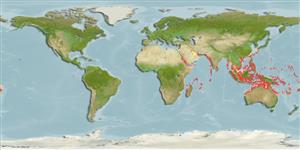>
Scombriformes (Mackerels) >
Scombridae (Mackerels, tunas, bonitos) > Scombrinae
Etymology: Grammatorcynus: Greek, gramma = signal, mark + Greek, rhyngchos = snout.
More on author: Rüppell.
Environment: milieu / climate zone / depth range / distribution range
ນິເວດວິທະຍາ
ສັດທະເລ ກ່ຽວກັນຫີນ; ປາທີ່ມີການເຄື່ອນຍ້າຍໃນສະເພາະມາະຫາສະມຸດ (Ref. 51243); ລະດັບຄວາມເລິກ 15 - 50 m (Ref. 86942). Subtropical; 31°N - 25°S, 32°E - 175°W (Ref. 168)
Indian Ocean: Red Sea eastward to the Andaman Sea. Western Pacific: Ryukyu Islands to the northern coasts of Australia, including the Marshall Islands and Fiji. Often confused in the literature with Grammatorcynus bicarinatus.
Length at first maturity / ຂະໜາດ / ນ້ຳໜັກ / Age
Maturity: Lm 41.5, range 40 - 43 cm
Max length : 100.0 cm FL ຕົວຜູ້/ບໍ່ມີເພດ; (Ref. 9684); common length : 50.0 cm TL ຕົວຜູ້/ບໍ່ມີເພດ; (Ref. 5450); ນ້ຳໜັກສູງສຸດທີ່ເຄຍຈັດພີມມາ: 3.5 kg (Ref. 168)
ຄີ (ໜາມ)ແຂງຢູ່ຫຼັງປາ (ທັງໝົດ) : 11 - 13; ຄີຫຼັງຂອງປາ (ຄີອ່ອນ) (ທັງໝົດ) : 10 - 14; ຄີ(ໜາມ) ແຂງຢູ່ຄີກົ້ນປາ
ກຸ່ມປາກະດູກແຂງ
ຄວາມຖີ່ຂອງກຸ່ມຖ່າຍທອດພັນ
ປາທີ່ມີການເຄື່ອນຍ້າຍຈາກທະເລໄປຫານ້ຳຈືດ ແລະນ້ຳຈືດຫາທະເລ
ປາທີ່ມີການເຄື່ອນຍ້າຍຈາກທະເລແລະໄປໄຂ່ຢູ່ນ້ຳຈືດ
ຄີກົ້ນຂອງປາ
ສັດທີ່ມີກະດູກສັນຫັຼງ
ການຖ່າຍທອດທາງກຳມະພັນຈາກພໍ່ແມ່ຫາລູກ: 0; ຄີກົ້ນຂອງປາ: 10 - 14. Mouth relatively small, upper jaw reaching about to middle of eye. Pectoral fins stout. Interpelvic process short and single. No prominent anterior corselet present. Swim bladder present. Vertebrae 14 precaudal plus 17 caudal, total 31 as in mackerel (Scomber and Rastrelliger).
Inhabits open water but often seen swimming near outer reef walls or deep clear-water slopes (Ref. 48637). Found mostly in shallow reef waters where it forms large schools. Feeds on crustaceans and fishes, particularly clupeoids (Sardinella, Thrissocles), and other fishes such as Sphyraena and Balistes. Marketed canned and frozen (Ref. 9684). Its flesh is mild and pleasantly flavored, but brushed with lemon juice prior to cooking to remove the ammonia-like smell (Ref. 9684).
Collette, B.B. and C.E. Nauen, 1983. FAO Species Catalogue. Vol. 2. Scombrids of the world. An annotated and illustrated catalogue of tunas, mackerels, bonitos and related species known to date. Rome: FAO. FAO Fish. Synop. 125(2):137 p. (Ref. 168)
IUCN Red List Status (Ref. 130435)
Threat to humans
Harmless
Human uses
ການປະມົງ: ທີ່ເປັນການຄ້າໜ້ອຍ; ຊະນິດປາທີ່ຖືກນຳໃຊ້ເຂົ້າໃນການຫາເພື່ອເປັນເກມກິລາ: ແມ່ນ
ເຄື່ອງມື
Special reports
Download XML
ແຫຼ່ງອີນເຕີເນັດ
Estimates based on models
Preferred temperature (Ref.
123201): 25.6 - 29.1, mean 28.2 °C (based on 632 cells).
Phylogenetic diversity index (Ref.
82804): PD
50 = 0.7500 [Uniqueness, from 0.5 = low to 2.0 = high].
Bayesian length-weight: a=0.00955 (0.00464 - 0.01966), b=3.05 (2.88 - 3.22), in cm total length, based on LWR estimates for this (Sub)family-body shape (Ref.
93245).
ຊັ້ນເຂດຮ້ອນ (Ref.
69278): 4.2 ±0.69 se; based on food items.
ຄວາມຢືດຢຸ່ນ (Ref.
120179): ຂະໜາດກາງ, ປະຊາກອນຕຳ່ສຸດທີ່ໃຊ້ເວລາສອງເທົ່າ 1.4 - 4.4 ປີ (Preliminary K or Fecundity.).
Fishing Vulnerability (Ref.
59153): High to very high vulnerability (67 of 100).
Climate Vulnerability (Ref.
125649): Very high vulnerability (89 of 100).
Nutrients (Ref.
124155): Calcium = 15 [8, 33] mg/100g; Iron = 0.698 [0.368, 1.368] mg/100g; Protein = 22.3 [20.9, 23.7] %; Omega3 = 0.204 [0.117, 0.367] g/100g; Selenium = 18.2 [9.1, 38.1] μg/100g; VitaminA = 47.6 [16.1, 154.0] μg/100g; Zinc = 0.491 [0.327, 0.753] mg/100g (wet weight);
